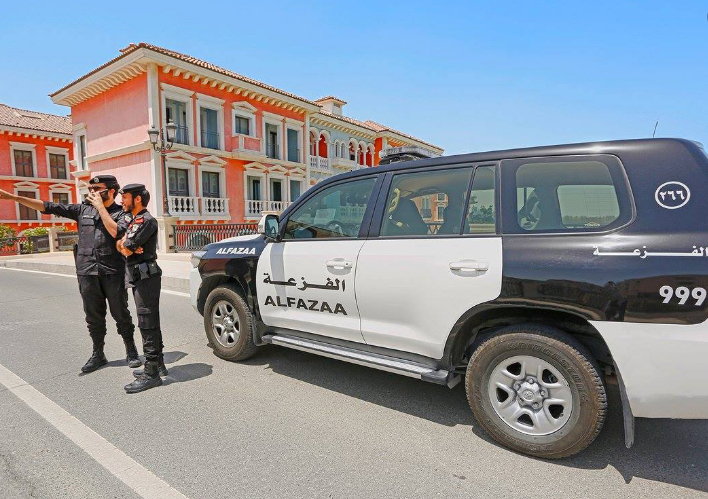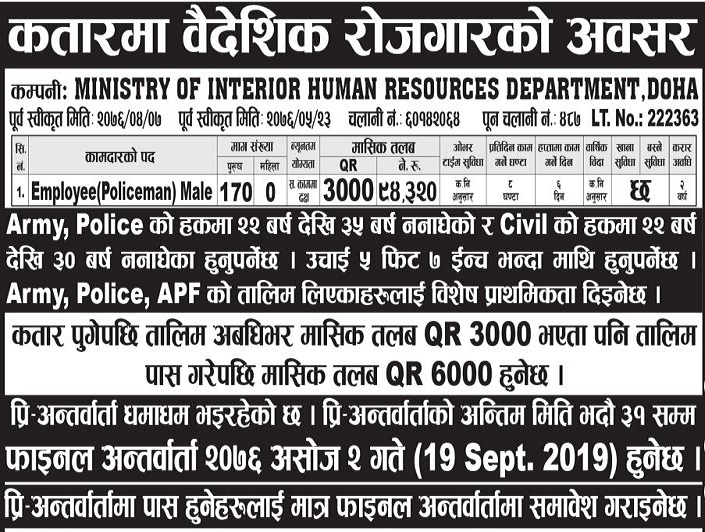Qatar Police recruitment row hits Nepalis

A row has broken out in Nepal over the recruitment of Nepalis for the Qatar Police which tried to bypass the country’s foreign employment rules, and in which Qatari officials appear to be involved.
The Department of Foreign Employment (DOFE), the regulatory body overseeing recruitment of overseas workers from Nepal, last week raided three companies (SOS Manpower Services, DD Human Resources and Hope International) for conducting interviews without permission for jobs in the Qatar Police.
Hundreds of workers had lined up and had been reportedly told that they would have to pay Rs800,000 each in exchange for the job if they got selected.
Rules state that both foreign employers and recruiters are supposed to get demand letters attested at the concerned missions abroad, obtain pre-approvals to conduct interviews, and publicly advertise the approved vacancies. But the recruiters had allegedly not followed this process.
“We received a complaint regarding such interviews being conducted after which we sent teams unannounced to investigate. The recruiters did not follow any of the due processes required,” Kumar Dahal, Director General of DOFE told Nepali Times.
Dahal added that the recruitment companies has submitted justifications which are being investigated. Meanwhile all three companies have been suspended until further notice. “This speaks volumes about the malpractices rampant in the recruitment of process and that there is collusion between different parties involved,” Dahal added.

What made the issue more suspicious and caused an uproar is that a blue-plated Qatar Embassy vehicle was parked in one of the recruitment companies premises in Kathmandu when the raid took place, and there was a Qatari official present at the premises. The Qatar Embassy in Nepal has clarified it was not involved in the recruitment of Nepali workers, and was simply providing the vehicle to a Qatari delegation inspecting the recruiters.
This is not the first time recruitment for Qatar has been in a controversy. The establishment of the Qatar Visa Center (QVC), a one stop service to simplify the immigration, had also been criticised because it had been done without due consultation with the Nepal Government.
While streamlining recruitment through a single-window for medical tests and biometrics was considered a welcome step to save time and money for migrant workers, eye brows were raised about Hem Gurung of SOS, the private sector partner chosen by the Qataris to run QVC.
SOS is one of the recruitment companies now under the scanner for last week’s unauthorised recruitment. After initial resistance from the Labour Ministry to approve the establishment of QVC, it began operations in Nepal from early 2019.
Sujit Kumar Shrestha of NAFEA (Nepal Association of Foreign Employment Agencies) said there was speculation that all recruitment for Qatar was going to go through QVC, and they would be distributed to only 16 of the 854 recruitment companies in operation. The 16 were suspected to be forming a ‘syndicate’, which is against Nepal’s Foreign Employment regulation.
NAFEA raised concern with the Foreign Ministry, Labour Ministry and the Parliamentary Committee. A taskforce was formed to investigate the issue, which is still ongoing.
“At that time we met QVC chair Hem Gurung and the Qatar Ambassador to Nepal and had been assured by both that that there is no syndicate. We had also raised the issue of hiring for the Qatar Police through a more transparent and competitive process which was received positively,” Shrestha said.
Nepal's Ambassador to Qatar, Narad Nath Bharadwaj told Nepali Times from Doha that he had met Qatar Police officials last year who had expressed interest in hiring a few hundred Nepali workers. “I had advised that given the specific nature of this demand, it would be advisable to hire workers through a Government-to-Government agreement instead of through intermediaries,” Bharadwaj said.
Qatar Police had previously hired 179 Nepalis through a few selected recruitment agencies, also leading to a row. Which is why Bharadwaj had suggested the government-to-government model, since this was for the Qatari state police.
Last week, the Embassy in Doha resumed issuing demand attestation for Nepali workers, including for new ones, which had been halted during the pandemic. But there had been no demand letter for Qatar Police. Only existing workers on vacation were allowed to return.
Because it is a government job, the Qatar Police openings present a more secure employment, and besides Nepalis there are recruits from Pakistan, Morocco, Sudan in the force. The intake will probably increase because of the 2022 FIFA World Cup in Doha.
Nepalis in the Qatar Police are paid 3,000 Qatari Riyal (Rs97,000) for three months during training, after which they get Rs180,000 a month, excluding other benefits like overtime, end-of-service benefits, food and accommodation. However, few Nepalis who got those jobs in the previous batch of 179 recruits report paying recruitment agencies in Nepal Rs600,000 each for the job.
“People confuse this job with other security jobs, but it is not the same,” a Nepali in the Qatar Police force told us on the phone from Doha. “It is a lot more professional. We have to undergo a grueling training in the initial few months when we are tested to our limits. Few could not handle it and returned. I now make close to USD3,000 a month and feel like my future is secure.”
After training, the recruits are stationed at the courts, airports, jails etc and earn much better than other Nepali workers, with good facilities. Labour activists say it is unfortunate that this potentially rewarding job opportunity for Nepalis is now being thwarted by malpractice and vested interests of politically-connected individuals, and profit hungry recruiters in Nepal.




